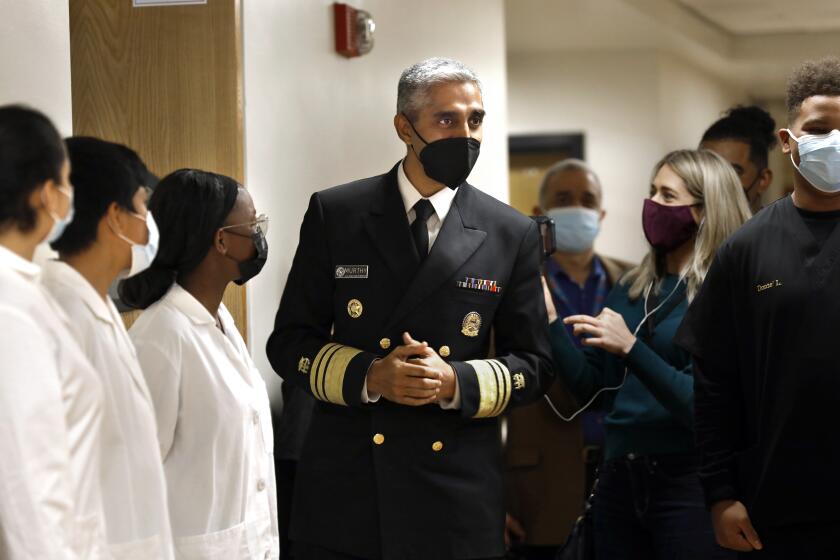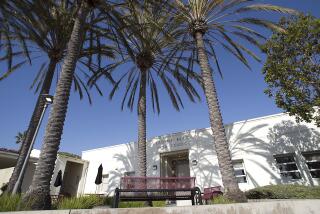Op-Ed: School surveillance on students’ laptops will not help solve the youth mental health crisis

In the past year, school districts in California and elsewhere have contracted with digital surveillance companies to spy on students at school and home, citing the need for mental health support during the pandemic.
Despite being a vigilant and involved parent, I found out only recently that my own kids, who attend high school in the Corona-Norco Unified School District, have been under constant digital surveillance for the past year.
Gaggle.net has a contract with Corona-Norco to monitor email accounts of students in seventh through 12th grade while using their district-issued laptops or school accounts on their own devices, according to district documents. The surveillance is meant to ensure that students aren’t accessing inappropriate content such as porn and also gauge students’ mental well-being by monitoring their accounts for terms and words such as “mentally unstable” and guns. Gaggle content reviewers email administrators with flags and call if they think a student might be in imminent danger of harm or death.
Today’s young are born into a digitally interconnected reality where big data and artificial intelligence will shape everyday existence long before the children are old enough to protect their privacy or give consent.
Schools have been filtering and blocking content on school networks or devices for years, but more districts have signed up for actual digital surveillance during the pandemic, justifying their decision because of widespread remote learning and worries about students’ mental health.
Companies such as Gaggle, El Segundo-based Go Guardian, San Jose-based Securly, and Bark Technologies, Inc. are capitalizing on those concerns to sell digital surveillance to more districts. The type of monitoring varies depending on the company and the services each offers, from tracking keywords in emails to taking screenshots of what students are watching on YouTube or social media sites.
Some new Go Guardian customers paid for the service with federal pandemic relief funds, and Securly even offered help administrators get started on stimulus funding applications. Gaggle reported 22% growth in the number of students covered by its services over the first year of the pandemic, reaching 1,500 school districts nationwide.
If an administrator cannot be reached after business hours, Gaggle is authorized to call law enforcement, company spokeswoman Alexandra Sollberger told me. Of the 6,400 “critical incidents” around the country in which Gaggle indicated a student was in danger between January and August 2021, the company called law enforcement for a “wellness check” in 26 instances.
Although law enforcement intervened in relatively few instances, the possibility of their involvement means Corona-Norco administrators should have done more to notify parents of Gaggle’s surveillance in a nearly 53,000-student, predominantly Latino district. I found out about the program after spotting a line item in the budget consent calendar of the October school board meeting that mentioned a contract with Gaggle.Net for “student mental health monitoring software” and then doing my own research.
Corona-Norco administrators approved their first contract with Gaggle for up to $104,000 using CARES Act funds in November 2020. Last month, the school board approved a yearlong extension for another $104,000. The district added a section about Gaggle to the Parent-Student Handbook in November after I questioned administrators about the lack of parental notification.
Since the district launched the Gaggle program in January 2021, administrators deemed that 108 instances out of 1,556 cases flagged by Gaggle required “immediate attention from CNUSD administrators and/or law enforcement,” according to district spokeswoman Evita Tapia-Gonzalez. The district does not keep data regarding “the specific number of home visits,” but administrators have possibly prevented students from harming themselves or others, Tapia-Gonzalez wrote in an email.
To be fair, the district is not viewing Gaggle as the end-all be-all for mental health. When I reached out as a parent to express my concerns, district administrators explained that Gaggle is part of a comprehensive safety and mental health process and is not meant to replace the safety work of human beings.
The advisory is to call attention to a “youth mental health crisis” and recommend resources to call on and actions to take.
Yet these tools meant to support students’ mental health may be counterproductive. A student at a Corona-Norco high school who was recently flagged by Gaggle for questionable content on his computer told me that although the school only issued him a warning for the infraction, his meeting with the administration left him feeling so distressed he wanted to leave school.
Parents agree to this monitoring by signing required forms during annual school registration on district policies around device usage and content filtering, much of it in legalese. I believe parents should receive clearer explanations of what they are consenting to and have a real opportunity to engage in debate on this issue — particularly given the potential involvement of law enforcement.
The secretive nature of the digital surveillance conducted by school districts nationwide has triggered probes by legislators and concerned civil rights and community groups. To give a sense of how many incidents can get flagged: A public records request by community groups represented by the American Civil Liberties Union found that at the 73,000-student Fresno Unified School District, Gaggle notified administrators of potential suicide and self-harm 410 times, and flagged 128 possible threats of violence toward others, between July 2020 and May 2021.
Of course, I know plenty of parents would willingly accept digital surveillance if it ensures the safety of their children. Young people are indeed experiencing a mental health crisis, leading the U.S. surgeon general to declare a public health advisory recently. But his office’s recommendations for schools included expanding support resources and training around mental health discussions, not expanding surveillance. Administrators should at minimum seek parent and student input on the issue to create a community based on trust.
There are no easy answers when it comes to student safety. For students already struggling to learn in a constrained environment, invasive surveillance with unknown privacy implications and lack of parental input isn’t the right response.
Minerva Canto is a longtime Southern California journalist.
More to Read
A cure for the common opinion
Get thought-provoking perspectives with our weekly newsletter.
You may occasionally receive promotional content from the Los Angeles Times.








